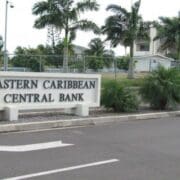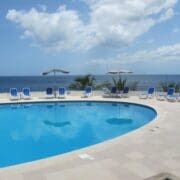ECCB Welcomes IMF’s 2022 Report On ECCU Common Policies Discussion – St. Lucia Times News
Black Immigrant Daily News
– Advertisement –
The Eastern Caribbean Central Bank (ECCB) welcomes the publication of the “Eastern Caribbean Currency Union – Staff Report for the 2022 Discussion on Common Policies of Member Countries” by the International Monetary Fund (IMF).
In May 2022, the IMF held discussions with stakeholders across the Eastern Caribbean Currency Union (ECCU), and with the ECCB and Member Governments.
This year’s discussions focused on the legacy impact of the COVID-19 pandemic and the effects of the war in Ukraine on the economies of the ECCU countries. Particular focus was given to the following policy areas:
Strengthening the resilience of fiscal frameworks;
Reinforcing Financial Sector Resilience;
Enhancing Competitiveness and Fostering a Resilient and Inclusive Recovery.
The IMF’s findings from the regional consultations were presented to the Fund’s Executive Board for discussion on 27 July 2022.
– Advertisement –
The ECCB agrees with the IMF’s recommendations on what should be the policy priorities for the Member Governments over the short to medium term to address the scarring effects of the pandemic and rising cost of living exacerbated by the war in Ukraine.
Based on IMF estimates, real GDP in the ECCU grew by 5.0 per cent in 2021 following the sharp contraction of 17.5 per cent in 2020 during the COVID-19 pandemic.
The economies of member countries are expected to gradually build momentum in their post-pandemic recovery in 2022. The ECCB provisionally estimates real GDP growth of 6.2 per cent for the ECCU in 2022, with output remaining below the pre-pandemic level.
The recovery in 2021 was fueled by a strong rebound of the Tourism industry in some countries, while other countries experienced increased activity in the construction sector. The recovery is expected to continue as countries relax restrictions and re-open their economies fully.
The situation, however, continues to be fluid as new COVID-19 variants emerge. The growing uncertainty regarding the war in Ukraine as well as shipping and supply chain constraints and climate-related risks continue to present significant threats to growth prospects and the outlook. Member countries are implementing key policy measures to reduce the impact of the risks on the domestic economies.
The IMF has done a commendable job of highlighting the major downside risks that the ECCU region faces at this juncture and offers important insights and recommendations as articulated in the Report. The ECCB provides some further insights into the issues and policy actions that are required to provide relief and spur an economic recovery.
1. Strengthening the Resilience of Fiscal Frameworks
Member governments have continued efforts to address the lingering effects of the COVID-19 pandemic on the fiscal deficits and debt positions of their respective economies. Responding to the pandemic necessitated significant outlays for health expenditure and social transfers to ensure that the most vulnerable were not marginalised.
This has resulted in widening of deficits and an escalation in debt levels. The region’s overall fiscal deficit more than doubled during the first year of the pandemic, moving from $442.4m (2.1 per cent of GDP) to $958.1m (5.6 per cent of GDP) and then declined to $573.4m (3.1 per cent of GDP) in 2021.
The pandemic reversed the 7-year downward trajectory of the debt-to-GDP ratio and resulted in a sharp increase in that ratio by 22.3 percentage points to 88.2 per cent at the end of 2020. Total debt for the ECCU remained elevated in 2021, notwithstanding a marginal decline to 87.3 per cent in the debt to GDP ratio.
As the impact of the pandemic continues to recede and economic activity resumed, there have been some improvements in governments’ finances. However, the adverse effect of the ongoing war in Ukraine on oil prices and cost of food are significant threats to further improvements. The ECCB, in its role as advisor to Member Governments on fiscal and debt sustainability, has advocated for the adoption of fiscal responsibility frameworks (FRFs) to achieve fiscal consolidation and attain the regional debt to GDP target of 60 per cent by 2035.
2. Reinforcing Financial Sector Resilience
The ECCB continues to closely monitor the implications of the COVID-19 pandemic for banking sector stability. The anticipated increase in non-performing loans (NPLs) during the course of the pandemic did not manifest and liquidity positions continued to be strong in 2021.
The NPL ratio peaked at 11.8 per cent in June 2021 and has remained stable at 11.7 per cent since September 2021.
However, as the loan deferral programme has concluded, banks are undertaking restructuring of loans and it is anticipated that there will be a surge in the NPL ratio.
In light of the elevated NPLs and credit risk, the Bank has undertaken measures to enhance its supervisory monitoring under its risk-based supervision framework. Two new standards were recently introduced: Treatment of Impaired Asset Standard (TIAS), which provides guidance on restructured and renegotiated loans, became effective on 1 January 2022 and the Consolidated Supervision Standard became effective on 1 April 2022.
Work continues on the phased implementation of the Basel II/III framework, which will strengthen the supervisory capacity of the Central Bank as regulator and address gaps in the current Basel I framework.
Additionally, the Bank is in the process of developing a Climate Risk Framework, which will support the integration of climate- related risks into financial stability monitoring and micro supervision.
ECCB persists with efforts at mitigating emerging risks through ongoing collaboration with Single Regulatory Units. This partnership involves strengthening regulatory oversight of the non-bank financial institutions, by the establishment of a standard regulatory framework for non-banks, under the auspices of a Regional Standard Setting Body, approved by the Monetary Council.
Work is progressing on the framework for this Regional Standard Setting Body.
The Bank continues to advocate for the urgent passage of reforms to strengthen the resilience of the financial sector. This includes passage of the Credit Reporting legislation in all member countries and consolidation of anti-money laundering and countering the financing of terrorism AML/CFT supervision under the responsibility of the Central Bank. The draft Deposit Insurance Policy is being amended to take into consideration funding for crisis resolution, following which the amended draft Deposit Insurance Bill would go through a consultative process.
3. Enhancing Competitiveness and Fostering a Resilient and Inclusive Recovery
The ECCB recognises the need to invigorate private sector growth and address the long- standing constraints of lending and credit access. This will require the urgent implementation of reforms to address the gaps in the credit infrastructure and increase access to credit. Since many of the ECCU economies are scarred due to the recent loss in output, the renewed focus is to elevate the growth trajectory of the region.
The ECCB recognizes that one of the key tools to boost competitiveness and accelerate growth will be access to credit.
Support for the productive sectors of the economy remain a priority through the enhancement of small and medium sized enterprises and the expansion of entrepreneurship.
Hence, in the quest to transform our region, while simultaneously building resilience, a credit bureau is imperative. In that regard, a license was issued to Creditinfo ECCU Ltd, which has started working on implementing a solution for the ECCU.
Acknowledgements
The Bank expresses its gratitude to the IMF staff who participated in the regional consultations, and prepared the Staff Report and accompanying documents.
The ECCB also appreciates the support provided by the Office of the Executive Director for Canada, Ireland and the Caribbean, and for the interventions of other Executive Directors of the IMF.
The Bank takes this opportunity to express its commitment to continuing the productive engagement and collaboration with the IMF on the key policy issues for the region.
The IMF’s “Eastern Caribbean Currency Union—Staff Report for the 2022 Discussion on Common Policies of Member Countries” is available on the IMF website.
Source: Eastern Caribbean Central Bank
– Advertisement –
NewsAmericasNow.com











